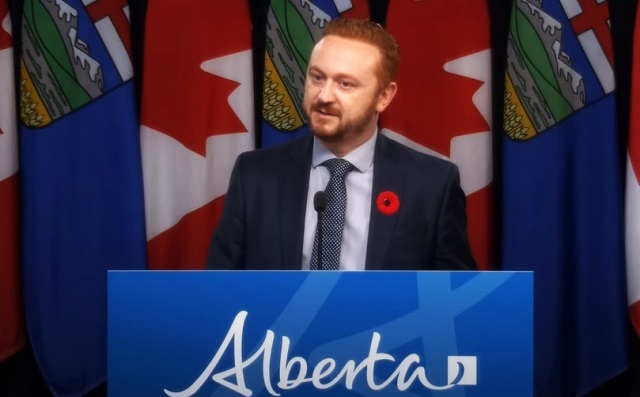Alberta
Alberta seeks to strip unelected officials of decision-making power during health emergencies

Alberta Justice Minister and Attorney General Mickey Amery
From LifeSiteNews
Bill 6 would prevent the province’s medical officer from having sole power to lock people down in their houses or mandate vaccines
Alberta’s United Conservative Party (UCP) government under Premier Danielle Smith is looking to pass a new law that would hold politicians accountable in times of a health crisis by putting sole decision-making on them for health matters instead of unelected medical officers.
Last Tuesday, Bill 6, or the Public Health Amendment Act, was tabled for first reading in Alberta’s legislature by Justice Minister and Attorney General Mickey Amery.
The bill comes in direct response to a recent court ruling that declared certain public health orders effectively null.
At the end of July, Justice Barbara Romaine from Alberta’s Court of Kings Bench ruled that politicians violated the province’s health act by making decisions regarding COVID mandates without authorization.
The decision put into doubt all cases involving those facing non-criminal COVID-related charges in the province.
Bill 6 would make it so that the province’s medical officer would not be allowed to act as an official who has the sole power to lock people down in their houses or mandate certain things such as jabs.
Amery said about his bill in a press release that elected officials “have a responsibility to act in the best interests of Albertans and swear an oath to duly and faithfully execute the powers and trust imparted.”
“This legislation ensures that final decision-making authority and the accountability that must come with it rest with those entrusted by Albertans,” he added.
Speaking about Bill 6 at a press conference, Amery said the recent court ruling showed that “Alberta needs to clarify the roles and responsibilities of cabinet and medical officers of health, including the chief medical officer of health, so that we can be in line with our own legislation in future declared states of public health emergencies.”
“I’d also say that Albertans also want our elected representatives to help with decision-making as well. I think that it’s important that Albertans know that the people that they elected in to this government have a pivotal role in making those decisions on their behalf,” he added.
As a result of July’s court ruling, Alberta Crown Prosecutions Service (ACPS) said Albertans currently facing COVID-related charges will likely not face conviction but will instead have their charges stayed.
Thus far, café owner Chris Scott, Alberta pastors James Coates, Tim Stephens, and Artur Pawlowski, who were all jailed for keeping their churches open under the leadership of former pro-lockdown Alberta Premier Jason Kenney, have had the COVID charges leveled against them dropped due to the court ruling.
Countless others have had smaller charges laid against them for going against COVID mandates dropped as well. However, there are still some facing charges relating to border blockade protests.
After Kenney stepped down from his role as premier and leader of the UCP, Smith took over and fired the province’s top doctor, Deena Hinshaw, and the entire Alberta Health Services (AHS) board of directors, all of whom oversaw the COVID mandates.
Smith made headlines last October after promising to look at pardoning Christian pastors who were jailed for violating so-called COVID policies while Kenney was premier and for apologizing to those who were discriminated against for not getting the COVID shots.
Smith was not premier when the pastors were charged. She won the leadership of the UCP in October 2022 and then a subsequent general election earlier this year on a platform that was against COVID mandates after Kenney stepped down due to poor approval ratings.
Alberta
Here’s why city hall should save ‘blanket rezoning’ in Calgary

From the Fraser Institute
By Tegan Hill and Austin Thompson
According to Calgarians for Thoughtful Growth (CFTG)—an organization advocating against “blanket rezoning”— housing would be more affordable if the mayor and council restricted what homes can be built in Calgary and where. But that gets the economics backwards.
Blanket rezoning—a 2024 policy that allowed homebuilders to construct duplexes, townhomes and fourplexes in most neighbourhoods—allowed more homebuilding, giving Calgarians more choice, and put downward pressure on prices. Mayor Farkas and several councillors campaigned on repealing blanket rezoning and on December 15 council will debate a motion that could start that process. As Calgarians debate the city’s housing rules, residents should understand the trade-offs involved.
When CFTG claims that blanket rezoning does “nothing” for affordability, it ignores a large body of economic research showing the opposite.
New homes are only built when they can be sold to willing homebuyers for a profit. Restrictions that limit the range of styles and locations for new homes, or that lock denser housing behind a long, costly and uncertain municipal approval process, inevitably eliminate many of these opportunities. That means fewer new homes are built, which worsens housing scarcity and pushes up prices. This intuitive story is backed up by study after study. An analysis by Canada’s federal housing agency put it simply: “higher residential land use regulation seems to be associated with lower housing affordability.”
CFTG also claims that blanket rezoning merely encourages “speculation” (i.e. buying to sell in the short-term for profit) by investors. Any profitable housing market may invite some speculative activity. But homebuilders and investors can only survive financially if they make homes that families are willing to buy or rent. The many Calgary families who bought or rented a new home enabled by blanket rezoning did so because they felt it was their best available option given its price, amenities and location—not because they were pawns in some speculative game. Calgarians benefit when they are free to choose the type of home and neighbourhood that best suits their family, rather than being constrained by the political whims of city hall.
And CFTG’s claim that blanket rezoning harms municipal finances also warrants scrutiny. More specifically, CFTG suggests that developers do not pay for infrastructure upgrades in established neighbourhoods, but this is simply incorrect. The City of Calgary charges an “Established Area Levy” to cover the cost of water and wastewater upgrades spurred by redevelopment projects—raising $16.5 million in 2024 alone. Builders in the downtown area must pay the “Centre City Levy,” which funds several local services (and generated $2.5 million in 2024).
It’s true that municipal fees on homes in new communities are generally higher, but that reflects the reality that new communities require far more new pipes, roads and facilities than established neighbourhoods.
Redeveloping established areas of the city means more residents can make use of streets, transit and other city services already in place, which is often the most cost-effective way for a city to grow. The City of Calgary’s own analysis finds that redevelopment in established neighbourhoods saves billions of taxpayer dollars on capital and operating costs for city services compared to an alternative scenario where homebuilding is concentrated in new suburban communities.
An honest debate about blanket rezoning ought to acknowledge the advantages this system has in promoting housing choice, housing affordability and the sustainability of municipal finances.
Clearly, many Calgarians felt blanket rezoning was undesirable when they voted for mayoral and council candidates who promised to change Calgary’s zoning rules. However, Calgarians also voted for a mayor who promised that more homes would be built faster, and at affordable prices—something that will be harder to achieve if city hall imposes tighter restrictions on where and what types of homes can be built. This unavoidable tension should be at the heart of the debate.
CFTG is promoting a comforting fairy tale where Calgary can tighten restrictions on homebuilding without limiting supply or driving up prices. In reality, no zoning regime delivers everything at once—greater neighbourhood control inevitably comes at the expense of housing choice and affordability. Calgarians—including the mayor and council—need a clear understanding of the trade-offs.
Alberta
The case for expanding Canada’s energy exports

From the Canadian Energy Centre
For Canada, the path to a stronger economy — and stronger global influence — runs through energy.
That’s the view of David Detomasi, a professor at the Smith School of Business at Queen’s University.
Detomasi, author of Profits and Power: Navigating the Politics and Geopolitics of Oil, argues that there is a moral case for developing Canada’s energy, both for Canadians and the world.
CEC: What does being an energy superpower mean to you?
DD: It means Canada is strong enough to affect the system as a whole by its choices.
There is something really valuable about Canada’s — and Alberta’s — way of producing carbon energy that goes beyond just the monetary rewards.
CEC: You talk about the moral case for developing Canada’s energy. What do you mean?
DD: I think the default assumption in public rhetoric is that the environmental movement is the only voice speaking for the moral betterment of the world. That needs to be challenged.
That public rhetoric is that the act of cultivating a powerful, effective economic engine is somehow wrong or bad, and that efforts to create wealth are somehow morally tainted.
I think that’s dead wrong. Economic growth is morally good, and we should foster it.
Economic growth generates money, and you can’t do anything you want to do in social expenditures without that engine.
Economic growth is critical to doing all the other things we want to do as Canadians, like having a publicly funded health care system or providing transfer payments to less well-off provinces.
Over the last 10 years, many people in Canada came to equate moral leadership with getting off of oil and gas as quickly as possible. I think that is a mistake, and far too narrow.
Instead, I think moral leadership means you play that game, you play it well, and you do it in our interest, in the Canadian way.
We need a solid base of economic prosperity in this country first, and then we can help others.
CEC: Why is it important to expand Canada’s energy trade?
DD: Canada is, and has always been, a trading nation, because we’ve got a lot of geography and not that many people.
If we don’t trade what we have with the outside world, we aren’t going to be able to develop economically, because we don’t have the internal size and capacity.
Historically, most of that trade has been with the United States. Geography and history mean it will always be our primary trade partner.
But the United States clearly can be an unreliable partner. Free and open trade matters more to Canada than it does to the U.S. Indeed, a big chunk of the American people is skeptical of participating in a global trading system.
As the United States perhaps withdraws from the international trading and investment system, there’s room for Canada to reinforce it in places where we can use our resource advantages to build new, stronger relationships.
One of these is Europe, which still imports a lot of gas. We can also build positive relationships with the enormous emerging markets of China and India, both of whom want and will need enormous supplies of energy for many decades.
I would like to be able to offer partners the alternative option of buying Canadian energy so that they are less reliant on, say, Iranian or Russian energy.
Canada can also maybe eventually help the two billion people in the world currently without energy access.
CEC: What benefits could Canadians gain by becoming an energy superpower?
DD: The first and primary responsibility of our federal government is to look after Canada. At the end of the day, the goal is to improve Canada’s welfare and enhance its sovereignty.
More carbon energy development helps Canada. We have massive debt, an investment crisis and productivity problems that we’ve been talking about forever. Economic and job growth are weak.
Solving these will require profitable and productive industries. We don’t have so many economic strengths in this country that we can voluntarily ignore or constrain one of our biggest industries.
The economic benefits pay for things that make you stronger as a country.
They make you more resilient on the social welfare front and make increasing defence expenditures, which we sorely need, more affordable. It allows us to manage the debt that we’re running up, and supports deals for Canada’s Indigenous peoples.
CEC: Are there specific projects that you advocate for to make Canada an energy superpower?
DD: Canada’s energy needs egress, and getting it out to places other than the United States. That means more transport and port facilities to Canada’s coasts.
We also need domestic energy transport networks. People don’t know this, but a big chunk of Ontario’s oil supply runs through Michigan, posing a latent security risk to Ontario’s energy security.
We need to change the perception that pipelines are evil. There’s a spiderweb of them across the globe, and more are being built.
Building pipelines here, with Canadian technology and know-how, builds our competitiveness and enhances our sovereignty.
Economic growth enhances sovereignty and provides the resources to do other things. We should applaud and encourage it, and the carbon energy sector can lead the way.
-

 National1 day ago
National1 day agoCanada’s free speech record is cracking under pressure
-

 Digital ID23 hours ago
Digital ID23 hours agoCanada considers creating national ID system using digital passports for domestic use
-

 Business1 day ago
Business1 day agoAlbertans give most on average but Canadian generosity hits lowest point in 20 years
-

 Business1 day ago
Business1 day agoTaxpayers Federation calls on politicians to reject funding for new Ottawa Senators arena
-

 Fraser Institute23 hours ago
Fraser Institute23 hours agoClaims about ‘unmarked graves’ don’t withstand scrutiny
-

 Crime2 days ago
Crime2 days agoU.S. seizes Cuba-bound ship with illicit Iranian oil history
-

 Daily Caller2 days ago
Daily Caller2 days agoUS Supreme Court Has Chance To End Climate Lawfare
-

 Bruce Dowbiggin1 day ago
Bruce Dowbiggin1 day agoCarney Hears A Who: Here Comes The Grinch












